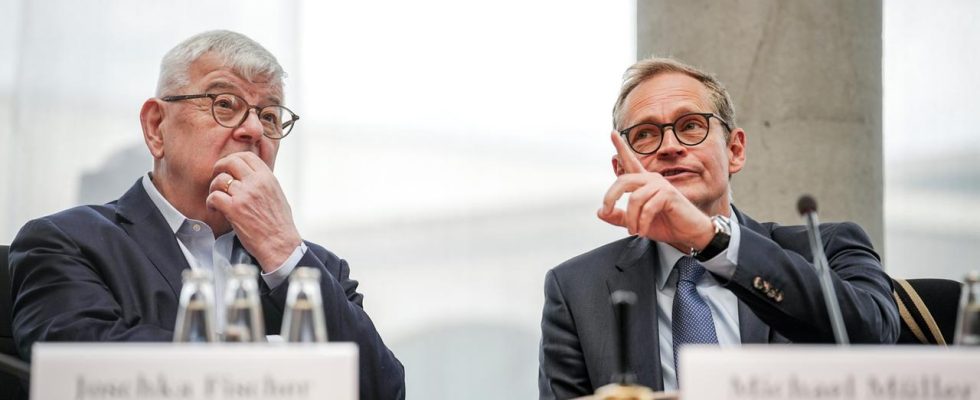A Bundestag commission wants to draw “lessons from Afghanistan” – and invited ex-Foreign Minister Fischer, among others, to do so today. He did not call the mission a mistake, but admitted deficits.
The star guest of the day does not seem – at least on the outside – to be overflowing with enthusiasm for what is to come: Arms crossed in front of his chest, leaning far back in his chair, eyes half closed, Joschka Fischer has long before the start of the survey in the semicircle of the seated in the meeting room of the Bundestag. But when it starts, the former foreign minister is wide awake and crystal clear in his analysis.
A German refusal to participate in the United States’ engagement in Afghanistan was unthinkable after the al-Qaeda terrorist attacks in New York in 2001: “If we hadn’t gone along, we would have paid an enormously high price as an alliance,” he said fisherman. But the 75-year-old does not stop at taking those gathered in the hall on a journey back in time to 2001, to the beginning of the Afghanistan mission. He draws a clear line of connection to today.
“Have no illusions”
From Fischer’s point of view, the dependency on the USA, then as now, was huge – which is why Germany’s room for maneuver was small. “Don’t be under any illusions about our dependency today!” warns the Green politician. Which leads him to what he sees as perhaps the most important lesson he can learn from Afghanistan: Without military weight, without “hard power,” as Fischer calls it, German politics will continue to have a hard time in the future.
“If we want to do more and want to do more politically, we will have to make the appropriate skills available. Otherwise the intentions will remain positive – but nothing will come of it.” That is exactly the goal of the Enquete Commission with its ambitious task of coming to terms with 20 years in the Hindu Kush: to draw lessons for the future.
Today, no one denies that the Bundeswehr was completely unprepared and inadequately equipped for this mission. But beyond that, on the day when a former federal minister and two former ministers were questioned, opinions differed.
Joschka Fischer (right) was Federal Foreign Minister from 1998 to 2005 – and according to our correspondent, before the meeting of the Enquete Commission, did not seem overflowing with enthusiasm.
“Speculums of Hope”
“Now there may be a problematic thought,” was how the former head of the Chancellery and later Defense and Interior Minister Thomas de Maiziere introduced one of his conclusions. “During the Afghanistan mission, Germany gained respect as a security power – which it didn’t have before,” says the CDU politician.
When it came to the question of the usefulness of the German mission, the respondents came to very different conclusions. “Was everything in vain? No,” said former Development Minister Heidemarie Wieczorek-Zeul in the same breath. “In the 20 years of freer life chances for young people and for women – there are germ cells of hope that in my opinion no one can and should push aside.”
The former head of the Federal Intelligence Service, Gerhard Schindler, was responsible for an accurate picture of the security situation in Afghanistan. He reported ever-decreasing green zones – areas under government control – and ever-expanding red zones – areas under Taliban control.
Doubts that last to this day
“During my term of office from 2012 to 2016, I had serious doubts about the sense of the engagement in Afghanistan. And I still have these doubts today,” said the former BND chief. When asked whether he had expressed these doubts so clearly at the time, he replied that the reports were actually self-explanatory.
Former Foreign Minister Fischer did not want to speak of a mistake in having participated. But remarked critically that back then, in 2001, you were not overly blessed with knowledge about Afghanistan. Or, to use his words: At the time, no one started out with a “big box of skills” – neither in military terms, nor in development policy terms, nor diplomatically. “It was a jump in at the deep end.”
And today – more than 20 years later – the former foreign minister openly admitted that the situation after the Taliban regained power was “terrible”.

